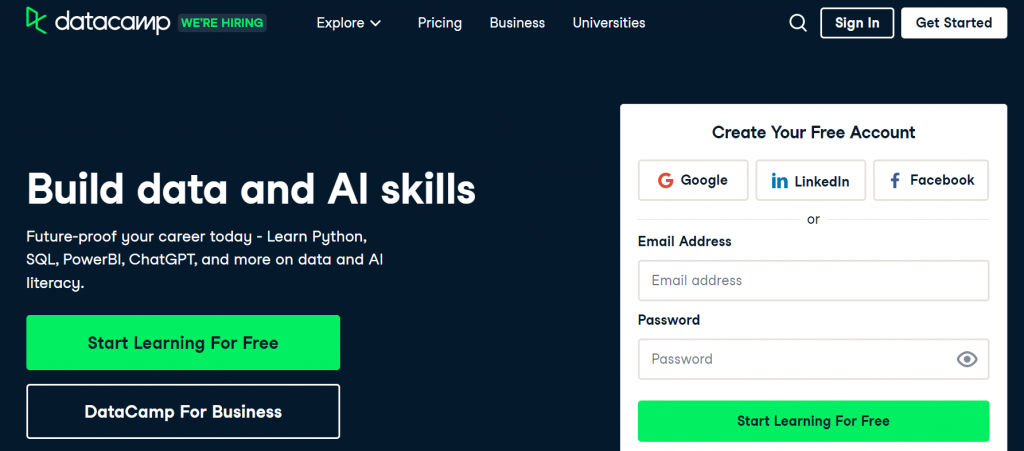
Welcome to the world of data and AI training! In today’s fast-paced digital age, it is vital to stay ahead of the curve with cutting-edge technology such as artificial intelligence. Data and AI training have become increasingly important in recent years due to their ability to transform businesses and industries alike. From predictive analytics to machine learning, there are endless possibilities for those who possess a solid understanding of this field. In this comprehensive guide, we will explore why data and AI training is crucial, the various types available, pros and cons associated with them, the future direction of this exciting industry and how you can get started on your journey towards mastering data science skills. Read on to discover everything you need to know about data & AI training!
Data and AI Training: Why It’s Important
In today’s digital era, data and AI training have become increasingly important. This is because businesses are continuously relying on technology to improve their operations and solve complex problems. With the increase in available data, companies need professionals with expertise in handling it.
Data and AI training equip individuals with skills that allow them to analyze large datasets effectively. By leveraging statistical modeling techniques like machine learning algorithms, they can extract valuable insights from vast amounts of data.
Furthermore, trained experts can develop predictive models that help businesses make informed decisions based on these patterns. For example, predictions about customer buying behavior or forecasting demand for a particular product.
The Different Types of Data and AI Trainings
The field of data and AI training has grown exponentially in recent years, with a wide range of options available for individuals looking to expand their knowledge in this area. The different types of data and AI trainings can be broadly categorized into the following categories:
1) Online courses: These are typically self-paced courses that cover various topics related to data analysis, machine learning, deep learning, natural language processing (NLP), etc. Many online course providers offer certifications upon completion.
2) Bootcamps: These are intensive programs designed to teach participants how to code and work with large datasets using cutting-edge tools and technologies such as Python/R programming languages, TensorFlow/Keras libraries, etc.
3) Workshops: These are usually short-term events where experts share their knowledge on specific topics such as predictive modeling or data visualization.
4) Conferences: These events provide an opportunity for professionals from various industries to learn about new trends in the field of data analysis & AI through keynote speeches, panel discussions & networking sessions.
5) In-house training: Some organizations opt for customized training programs tailored according to their specific business requirements which include hands-on experience under industry experts’ guidance
Pros and Cons of Data and AI Training

Data and AI training has become increasingly important as companies are realizing the potential benefits of incorporating these technologies into their operations. However, like any other type of training, there are both pros and cons to consider.
One major advantage is that data and AI training can help individuals develop new skills that are currently in high demand. As more businesses adopt these technologies, there is a growing need for professionals who have experience with handling large amounts of data and using machine learning algorithms to extract insights from it.
Another benefit is that data and AI training can help companies improve their overall efficiency by automating certain tasks. For example, an algorithm could be trained to perform repetitive manual labor such as sorting through customer service queries or processing invoices.
However, there are also some downsides to consider when it comes to data and AI training. One potential con is that the technology itself may not always be accurate or reliable. Machine learning algorithms often depend heavily on the quality of the input data they receive, so if this data isn’t up-to-date or relevant then the output may not be trustworthy either.
What Is the Future of Data and AI Training?
The future of data and AI training is bright and promising. As technology continues to advance, the demand for skilled professionals who can analyze and interpret large amounts of data will only continue to grow.
One area where we can expect to see significant growth is in machine learning. With the rise of big data, organizations are looking for ways to automate their processes and make predictions based on historical trends. This requires a deep understanding of algorithms, statistical models, and programming languages like Python or R.
Another trend that we’re likely to see in the coming years is an increased focus on ethical considerations when it comes to handling sensitive information. As more companies collect vast amounts of personal data from customers, there will be a need for individuals who understand how to handle this information responsibly while still extracting insights that can drive business decisions.
How to Get Started with Data and AI Training
Getting started with data and AI training can seem daunting, especially for those who have little to no experience in the field. However, with the right resources and approach, anyone can begin their journey towards mastering these essential skills.
Firstly, it’s important to identify your specific goals and interests within data and AI. Do you want to focus on machine learning algorithms or data visualization techniques? Are you more interested in natural language processing or predictive analytics? Once you know what you want to learn, it’ll be easier to find relevant courses and tutorials.
There are many online platforms that offer high-quality data and AI training, such as Coursera, edX, Udacity, DataCamp, etc. These websites provide structured curriculums that guide learners from beginner-level concepts all the way up to advanced topics.
Another option is seeking out local meetups or workshops centered around data science or artificial intelligence. This provides an opportunity for hands-on learning by working alongside industry professionals while building a network of like-minded individuals.
Learn The Concepts With Datacamp Website

In today’s fast-paced digital world, data and AI are becoming increasingly important for businesses to stay ahead of their competition. Data and AI training can help individuals gain expertise in these fields, which can lead to better job prospects and career growth.
With the right type of data and AI training, you can learn how to manipulate large data sets, develop algorithms that drive machine learning systems, create predictive models that inform business decisions with accuracy, among other benefits.
It’s important to note that there are different types of data and AI trainings available depending on what you want to specialize in or achieve. The key is finding the program that fits your needs best.
One great resource for those looking for a comprehensive guide on data science is Datacamp website which offers a variety of courses ranging from beginner level introductions to advanced topics such as predictive analytics using machine learning techniques.
Whether you’re just starting out or looking for ways to improve your knowledge in this field – Datacamp could be an excellent option! Check it out today!





